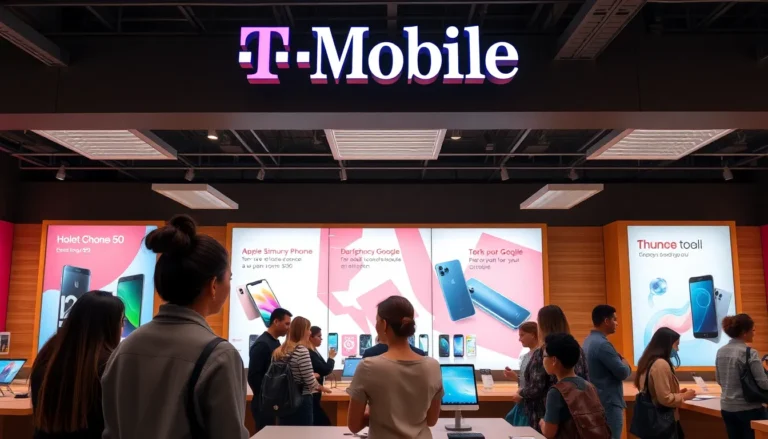In a world where everyone’s glued to their phones, mobile tech apps have become the superheroes of daily life. They swoop in to save the day, whether it’s managing schedules, tracking fitness goals, or even finding the best pizza nearby. Who knew that a tiny screen could hold so much power?
Table of Contents
ToggleOverview of Mobile Tech Apps
Mobile tech apps serve critical functions in daily life. They provide efficient solutions for managing schedules. Users often rely on these apps to organize appointments, ensuring they stay productive throughout their day. Fitness tracking is another area where apps excel. Individuals can monitor their physical activities, set goals, and track progress seamlessly.
Location-based services have transformed how users find nearby amenities. Apps can quickly identify restaurants, gas stations, and other essential services, enhancing convenience. Additionally, financial management apps help users keep budgets in check. They facilitate expense tracking and provide reminders for bill payments, ensuring financial responsibilities are met.
Education benefits from mobile tech apps as well. Students can access learning materials, take quizzes, and collaborate on projects from anywhere. Such accessibility improves learning experiences and promotes engagement. Communication apps foster connections among users, allowing for instant messaging, video calls, and social networking.
With continuous advancements, mobile tech apps evolve to meet changing user needs. They incorporate artificial intelligence to deliver personalized experiences. Increased integration with smart devices enhances functionality, creating cohesive ecosystems for users. Mobile tech apps represent invaluable tools, simplifying daily tasks and enriching overall lifestyles.
Key Features of Mobile Tech Apps

Mobile tech apps possess features that enhance user engagement and ensure effective functionality. User-friendly designs and robust security measures stand out as essential elements.
User Interface and Experience
Intuitive navigation enhances usability for users of all ages. Visual appeal captivates attention and helps in maintaining interest. Responsive layouts adapt to different screen sizes, ensuring comfort while using various apps. Customizable options allow individuals to tailor interfaces according to personal preferences. Accessible features support users with disabilities, making technology inclusive. Overall, effective designs promote ease of interaction, leading to increased satisfaction.
Security and Privacy
Data protection remains a priority for mobile tech apps, ensuring that user information stays secure. Strong encryption technology safeguards sensitive information from unauthorized access. Regular updates patch vulnerabilities, keeping apps resilient against emerging threats. Clear privacy policies inform users about data collection practices, fostering transparency. User-controlled settings provide options to manage personal data sharing, empowering individuals. Through these protocols, mobile tech apps build trust and offer peace of mind while navigating digital environments.
Popular Mobile Tech Apps on the Market
Mobile tech apps dominate the market, offering diverse functionality for various needs. These applications streamline tasks and enhance everyday experiences.
App Functionality
Functionality is a primary factor influencing app popularity. Task management apps like Todoist aid users in organizing their daily responsibilities effectively. Fitness apps, such as MyFitnessPal, allow individuals to log food intake and monitor exercise routines seamlessly. Navigation apps like Google Maps provide real-time traffic updates, ensuring users reach destinations quickly. Financial management software, including Mint, helps track spending and set budgets effectively. Education platforms like Duolingo offer language learning through engaging lessons. Communication tools, exemplified by WhatsApp, facilitate instant messaging and video calls. All these features significantly enhance user experience and satisfaction.
User Ratings and Feedback
User feedback often reflects app effectiveness and areas for improvement. High ratings typically indicate strong user engagement and satisfaction. For instance, many fitness apps receive praise for intuitive interfaces and helpful features. Educational apps generally garner positive reviews for their ability to make learning accessible. Communication apps frequently showcase favorable ratings for reliability and security. Ratings and reviews are essential factors that potential users consider before downloading. Users often share experiences, highlighting strengths and potential challenges. Overall, ratings can guide future updates and enhancements, creating a more user-centric app development approach.
Future Trends in Mobile Tech Apps
Emerging trends in mobile tech apps suggest a shift toward greater personalization and intuitive user experiences. Developers emphasize machine learning to tailor app functionalities based on user habits. Enhanced artificial intelligence capabilities streamline interactions, providing recommendations that align with individual preferences.
Adapting to a growing demand for voice-enabled functionalities, numerous apps now integrate voice recognition. This feature increases accessibility, allowing users to interact hands-free. Augmented reality experiences enhance learning and shopping apps, merging digital and real-world environments seamlessly.
Security continues to be a pivotal factor. Developers implement biometric authentication methods, such as fingerprint and face recognition, to safeguard user data. Emphasizing transparency, privacy-centered apps offer users control over their data-sharing preferences.
Cross-platform compatibility also gains traction as users seek seamless experiences across devices. Mobile tech apps prioritize integration with wearables and smart home devices, fostering interconnected ecosystems. Improving user navigation, updates introduce streamlined interfaces that enhance usability.
Sustainability emerges as another vital trend. Developers increasingly focus on minimizing the environmental impact of apps, aiming for energy-efficient coding practices. Notably, social responsibility features are included, promoting awareness around sustainable habits.
In education, mobile tech apps leverage gamification to increase student engagement and retention. Learning tools adopt playful elements that motivate users, transforming traditional studying into interactive experiences. On-demand access to educational resources complements this trend.
Investments in mobile tech ecosystems provide exciting opportunities for innovation. Task management and productivity apps continuously evolve, integrating new features that adapt to user feedback. This evolution ensures they meet the expanding needs of modern lifestyles.
Mobile tech apps have become indispensable in navigating daily life. They streamline tasks and enhance productivity while keeping users connected and informed. As technology advances these apps will continue to evolve, offering more personalized experiences and innovative features that cater to individual needs.
The focus on user-friendly designs and robust security measures ensures that users can engage confidently with their favorite applications. With the integration of AI and other emerging technologies, the future of mobile tech apps looks promising. They’re set to redefine how people interact with technology and manage their lives, all while fostering inclusivity and sustainability. Embracing these tools can lead to a more organized and fulfilling lifestyle.


